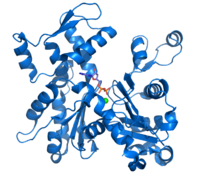
Risk Variants in the Exomes of Children With Critical Illness
Sign Up to like & getrecommendations! Published in 2022 at "JAMA Network Open"
DOI: 10.1001/jamanetworkopen.2022.39122
Abstract: Key Points Question Do the exomes of critically ill children without a genetic diagnosis carry risk factors? Findings This genetic association study of 267 children with critical illness and 18 deceased children found a statistically… read more here.
Keywords: children critical; risk variants; loss function; critical illness ... See more keywords

Targeting TWIST1 through loss of function inhibits tumorigenicity of human glioblastoma
Sign Up to like & getrecommendations! Published in 2018 at "Molecular Oncology"
DOI: 10.1002/1878-0261.12320
Abstract: TWIST1 (TW) is a bHLH transcription factor (TF) and master regulator of the epithelial‐to‐mesenchymal transition (EMT). In vitro, TW promotes mesenchymal change, invasion, and self‐renewal in glioblastoma (GBM) cells. However, the potential therapeutic relevance of… read more here.
Keywords: glioblastoma; loss function; tumorigenicity; human gbm ... See more keywords

Detection of phenotype‐specific therapeutic vulnerabilities in breast cells using a CRISPR loss‐of‐function screen
Sign Up to like & getrecommendations! Published in 2021 at "Molecular Oncology"
DOI: 10.1002/1878-0261.12951
Abstract: Cellular phenotype plasticity between the epithelial and mesenchymal states has been linked to metastasis and heterogeneous responses to cancer therapy, and remains a challenge for the treatment of triple‐negative breast cancer (TNBC). Here, we used… read more here.
Keywords: phenotype; loss function; function screen; phenotype specific ... See more keywords

Loss of function, missense, and intronic variants in NOTCH1 confer different risks for left ventricular outflow tract obstructive heart defects in two European cohorts
Sign Up to like & getrecommendations! Published in 2019 at "Genetic Epidemiology"
DOI: 10.1002/gepi.22176
Abstract: Loss of function variants in NOTCH1 cause left ventricular outflow tract obstructive defects (LVOTO). However, the risk conferred by rare and noncoding variants in NOTCH1 for LVOTO remains largely uncharacterized. In a cohort of 49… read more here.
Keywords: loss function; intronic variants; risk; variants notch1 ... See more keywords

Recommendations for interpreting the loss of function PVS1 ACMG/AMP variant criterion
Sign Up to like & getrecommendations! Published in 2018 at "Human Mutation"
DOI: 10.1002/humu.23626
Abstract: The 2015 ACMG/AMP sequence variant interpretation guideline provided a framework for classifying variants based on several benign and pathogenic evidence criteria, including a pathogenic criterion (PVS1) for predicted loss of function variants. However, the guideline… read more here.
Keywords: loss function; acmg amp; criterion; loss ... See more keywords

Further delineation of putative ACTB loss‐of‐function variants: A 4‐patient series
Sign Up to like & getrecommendations! Published in 2020 at "Human Mutation"
DOI: 10.1002/humu.23970
Abstract: ACTB encodes β‐cytoplasmic actin, an essential component of the cytoskeleton. Based on chromosome 7p22.1 deletions that include the ACTB locus and on rare truncating ACTB variants, a phenotype resulting from ACTB haploinsufficiency was recently proposed.… read more here.
Keywords: loss function; function variants; actb loss; putative actb ... See more keywords

An assessment of the role of vinculin loss of function variants in inherited cardiomyopathy
Sign Up to like & getrecommendations! Published in 2020 at "Human Mutation"
DOI: 10.1002/humu.24061
Abstract: The ACMG/AMP variant classification framework was intended for highly penetrant Mendelian conditions. While it is appreciated that clinically relevant variants exhibit a wide spectrum of penetrance, accurately assessing and expressing the pathogenicity of variants with… read more here.
Keywords: vinculin; penetrance; loss function; function variants ... See more keywords

Biallelic deep intronic variant c.5457+81T>A in TRIP11 causes loss of function and results in achondrogenesis 1A
Sign Up to like & getrecommendations! Published in 2021 at "Human Mutation"
DOI: 10.1002/humu.24235
Abstract: Biallelic loss of function variants in TRIP11 encoding for the Golgi microtubule‐associated protein 210 (GMAP‐210) causes the lethal chondrodysplasia achondrogenesis type 1A (ACG1A). Loss of TRIP11 activity has been shown to impair Golgi structure, vesicular… read more here.
Keywords: 5457 81t; deep intronic; variant 5457; variant ... See more keywords

De novo putative loss‐of‐function variants in TAF4 are associated with a neuro‐developmental disorder
Sign Up to like & getrecommendations! Published in 2022 at "Human Mutation"
DOI: 10.1002/humu.24444
Abstract: TATA‐binding protein associated factor 4 (TAF4) is a subunit of the Transcription Factor IID (TFIID) complex, a central player in transcription initiation. Other members of this multimeric complex have been implicated previously as monogenic disease… read more here.
Keywords: putative loss; loss function; neuro developmental; variants taf4 ... See more keywords

Loss‐of‐Function Mutations in NR4A2 Cause Dopa‐Responsive Dystonia Parkinsonism
Sign Up to like & getrecommendations! Published in 2020 at "Movement Disorders"
DOI: 10.1002/mds.27982
Abstract: The group of dystonia genes is expanding, and mutations of these genes have been associated with various combined dystonia syndromes. Among the latter, the cause of some dystonia parkinsonism cases remains unknown. read more here.
Keywords: loss function; cause; function mutations; dystonia parkinsonism ... See more keywords

Genetic and clinical characteristics of 24 mainland Chinese patients with CTNNB1 loss‐of‐function variants
Sign Up to like & getrecommendations! Published in 2022 at "Molecular Genetics & Genomic Medicine"
DOI: 10.1002/mgg3.2067
Abstract: Neurodevelopmental disorder with spastic diplegia and visual defects (NEDSDV) is a rare autosomal dominant syndrome, which is caused by the heterozygous germline loss‐of‐function variants in CTNNB1. read more here.
Keywords: function variants; genetic clinical; clinical characteristics; loss function ... See more keywords